
News (832)
We mourn for Dr Babar Kabir

BRAC mourns the sad demise of Dr Babar Kabir who was the former senior director of BRAC's disaster management and climate change and water, sanitation and hygiene programmes. On the morning of 15 January at around 7 am, after a severe asthma attack, he succumbed to a cardiac arrest in Dhaka. He is survived by his wife and two daughters.
Dr Kabir completed his PhD in hydrogeology in 1986 from Azerbaijan State University and has been working in the field of environment and public health since then. He has served in the capacity of senior management roles at the World Bank-WSP, UNDP Bangladesh, Ministry of Environment and Forest, Government of Bangladesh as national programme coordinator for their Sustainable Environment Management Programme (SEMP), and other multilateral and bilateral organisations. In 2007, Dr Kabir joined BRAC as director of its water, sanitation and hygiene (WASH) and disaster management and climate change (DMCC) programmes, and in 2012 he became a senior director. He was also a member of the Executive Management Committee, which is BRAC’s management decision making committee.
Hinged on his leadership, BRAC provided more than 37 million people with hygienic sanitation and another two million with access to safe water in 250 sub-districts of Bangladesh. And in 2013, after the Rana Plaza disaster, BRAC reached out to number of survivors through health protection scheme, fixed deposit, skills development training for different livelihood followed by seed funding as investment to begin new life and psychosocial counselling to cope with post-traumatic stress disorder.
In 2014, Dr Kabir left BRAC to become a consultant in the WASH and microfinance sectors. He has over 15 publications in national and international journals and has co-authored a chapter on ‘Mitigation Strategies’ of the WHO monograph on arsenic initiated by UNACC.
Today, the BRAC family is deeply saddened by the departure of such a dynamic leader and a brilliant mind that came out of this nation.
BRAC awards 10 journalists for reporting on Migration
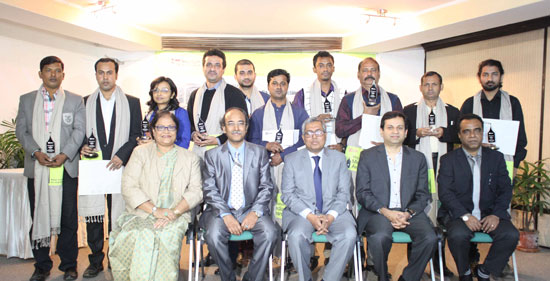
BRAC awarded 10 journalists from local and national media at an event in the capital today. BRAC Migration programme organised this event at BRAC Centre in recognition of media’s contribution in raising mass awareness on migration, migrant’s rights and welfare. This initiative was taken for the first time to acknowledge and encourage journalism in migration sector.
10 journalists from print, online and electronic media received the award from BRAC’s executive director Dr Muhammad Musa. A jury board of four members selected the winners on the criterion of raising public awareness, advocating for the rights, welfare and well-being of Bangladeshi migrant workers and their families. promoting a positive image of Bangladeshi migrants and creativity, originality and innovativeness of the content. The jury board members did not include any BRAC staff to maintain impartiality.
From the national print media category first, second and third positions were secured by Md Shariful Hasan of Prothom Alo, Md Abid Ajad Shuvo of Dhaka tribune, Belal Hossain Biplob of The Daily Star. The winners of local level category are Abu Bakar Siddiq (3rd) of Daily Jalalabad, Sylhet, Aftab Hossian (2nd) of Mayabazar, Rangpur; and Mohammad Sarif Eqbal (1st) of Laal Shobujer Desh, Khoj Khabor and Daily News, Narshingdi. Md Rabiul Islam of migrationnews.bd.com received the award in the online media category. From the electronic media category first, second and third were Salah Uddin Helali from Jamuna TV, Keramat Ullah Biplab from ATN Bangla and Jhumur Bari from 71 TV.
The keynote presentation was delivered by programme head of migration programme, Mr Hassan Imam before the award ceremony took place. Highlighting media exposure on migration he said, “Steps have been taken internationally and nationally to stop irregular migration through sea-root after substantial reporting in media.”
Present as special guest one of the jury board members, Joint Secretary of ministry of expatriates’ welfare and overseas employment Mr Kazi Abul Kalam said, “Bangladesh Government has recently rewarded BRAC for its significant work in migration sector. A special thanks to media for its strong role in bringing out stories of migrant workers in 2015. From Government, we are setting up a hotline number with the help of A2I for the migrants all over the world. We hope we will get all cooperation from media and civil society to help migrants in future.”
Appreciating media’s role in this sector BRAC’s ED Dr Musa said, “Collective effort by civil society, media and government can create a constructive movement to ensure migrant’s rights and their wellbeing. This award is our respect to media for their constructive and substantial role to ensure safe and quality migration.”
The event was moderated by BRAC’s senior director of strategy, empowerment and capacity Mr Asif Saleh. Director of BRAC’s gender, justice and diversity and migration programme was also present along with representatives from media, civil society and development organisations.
We mourn for Mahabub Hossain
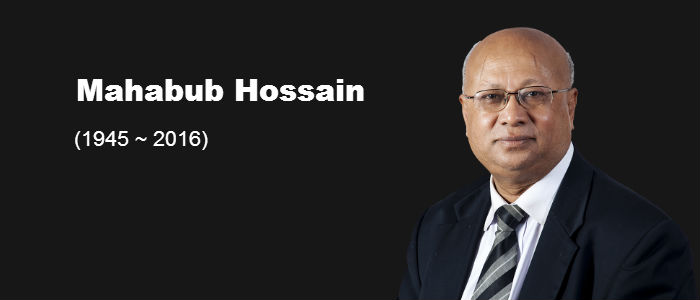
BRAC deeply mourns at the sad demise of Dr Mahabub Hossain, advisor of the executive director, BRAC and Distinguished Professor and Chairperson, Economics and Social Science department of BRAC University. He passed away on January 4, 2016, at 2.45 am (Bangladesh time) in Cleveland Hospital, USA at the age of 71. He left behind his wife, two daughters and a son.
In a life filled with brilliance, this eminent economist served as head of social science division of International Rice Research Institute (IRRI), Executive director of BRAC, and Director General of Bangladesh Institute of Development Studies (BIDS). An inspiring figure, he will be forever remembered for his brilliance in articulation of macro- economic analysis, his path breaking research works, his leadership in agricultural innovation and above all his deep empathy for the marginalised people.
After completing his Masters in Economics from Dhaka University, Dr Hossain obtained his PhD from the Cambridge University. Besides the publications of many research articles in international journals, some of his seminal books are: Asian Rice Bowls A Returning Crisis: Rice Research in Asia: Progress and Prospects; Impact of Rice Research in Asia; Strategy of Development in Bangladesh; Rural Economy and Livelihoods Insights from Bangladesh, Bish Geramer Golpo, Leading Issues in Rural Development. The global magazine of politics and economics-The Foreign Policy featured him in their list of 500 most prominent individuals in the international arena.
He was suffering from heart disease for last two years. He went to USA on 15 December 2015 for treatment purpose. He took his last breath at the operation table last night.
On his demise, BRAC founder and chairperson, Sir Fazle Hasan Abed said, “Very few people globally had the depth of understanding of development issues like Dr. Mahabub Hossain. His life was a story of success against all odds and during his time at BRAC, he had a persistent focus on creating opportunities for the poor. His research over many decades on proliferation of innovation in agriculture and livelihood improvement of marginalised farmers has been path breaking. We, his BRAC family, mourn today this irreparable loss with his friends, family and many people he touched during his life dedicated to public service.”
NGO of the year
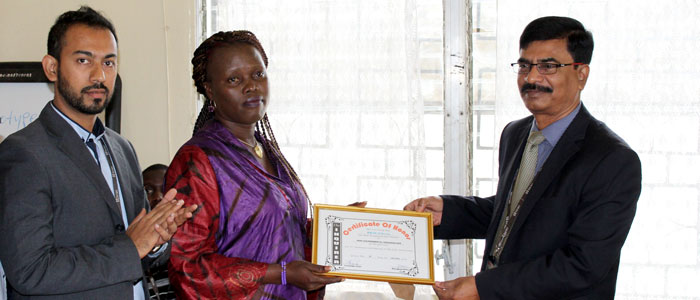
On 31 December 2015, the Inquirer newspaper awarded BRAC Liberia - the NGO of the year. This decision was based upon public entries sent to the newspaper along with the decision made by its editorial team. BRAC Liberia has been contributing towards improving the potentials of under-privileged people. It has been implementing development programmes in health, agriculture, poultry and livestock and microfinance sectors as well as scaling up reproductive maternal neo natal and child health services in the country.
The Inaugural Community Health Promoter Appreciation Day
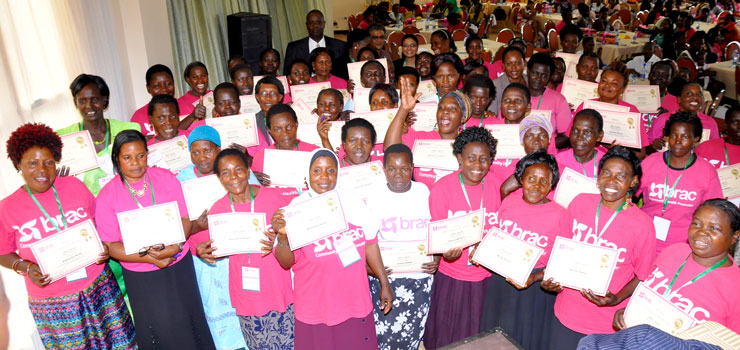
A Community Health Promoter (CHP) Appreciation day was held on the 18 December 2015. One hundred and thirty CHPs traveled from various parts of Uganda to Kampala for this event, which recognised and awarded fifty of the best CHPs for their outstanding service to their communities. The Chief guest, Assistant Commissioner of Health Promotion at the Ministry of Health Dr Paul Kagwa led other guests in applauding the health programme and the CHPs for their efforts to deliver basic healthcare services to the doorsteps of millions of Ugandans.
In his opening remarks BRAC Uganda Country Representative, Bhuiyan Muhammad Imran congratulated the CHPs for being instrumental in the reduction of mortality among under-5 children in areas where BRAC CHPs are active, based on research conducted by the Research and Evaluation Unit. The Coordinator BRAC Research Africa Dr Jenipher Twebaze Musoke gave a presentation that shed more light on the research work being carried out within the health programme followed by a presentation by the Health Programme Manager in Uganda, Sharmin Sharif and BRAC International Research Director Munshi Sulaiman.
Chief Guest Assistant Commissioner of Health Promotion at the Ministry of Health Dr Paul Kagwa expressed his gratitude to BRAC Uganda and the health programme for activities that are improving the lives of many Ugandans. He presented the best CHPs with certificates and gifts that included energy-efficient cook stoves and home solar-lighting kits.
BRAC’s service in migration gets recognition from government
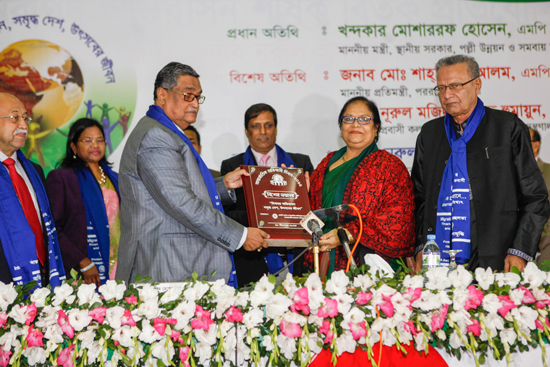
The Government of Bangladesh has awarded BRAC Migration Programme for its outstanding contribution in migration sector in promoting migrants' rights and raising awareness on safe migration in Bangladesh.
HE Mr Khandker Mosharraf Hossain,MP, Ministry of Local Government Rural Development and Co-Operatives, HE Mr Abul Hassan Mahmood Ali, MP, Foreign Minister and HE Mr Nurul Islam BSc, Ministry of Expatriates' Welfare and Overseas Employment, Government of the People's Republic of Bangladesh has handed over the award to BRAC on 18 December 2015 on the International Migrants Day at the Bangabandhu International Conference Centre. Ms Sheepa Hafiza, director of gender justice and diversity and migration programme received the award on behalf of BRAC.
Pioneering programme helps households climb out, and stay out, of extreme poverty
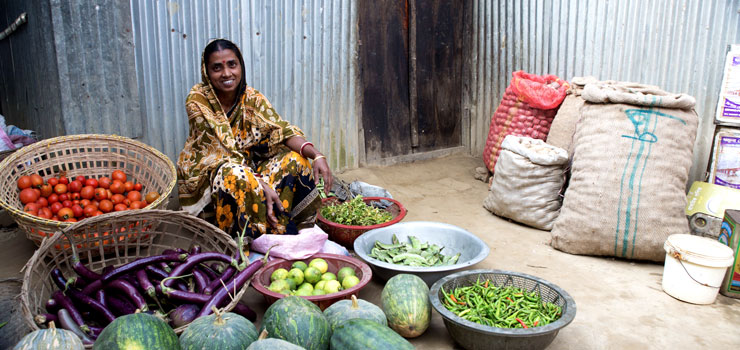
A programme pioneered by development organisation BRAC, which aims to help households escape extreme poverty by supporting women to set up their own small businesses, not only works but its benefits increase in the long term, according to an evaluation(1) led by researchers at the International Growth Centre (IGC), based at the London School of Economics and Political Science (LSE). The research findings in published today in London.
BRAC’s ‘Targeting the Ultra-Poor’ programme has benefitted 1.6 million households in Bangladesh by helping the very poorest women shift out of low paid and insecure work, such as casual agricultural work or domestic service, into running their own small businesses. It does this by providing them with large scale livestock assets alongside two years of complementary training.
Researchers found that, four years after taking part in the programme, the women increase their annual earnings by 37 per cent.
Seven years after the start of the programme, the increase in the women’s spending on non-durable goods, such as food, is 2.5 times larger than after four years. At the start of the programme, only 10 per cent of beneficiaries have access to renting or owning land – seven years later, this figure is nearly 40 per cent.
Four years after the programme is implemented, there is an eight percentage point decline in the number of households living on less than $1.25 per day(2). Households who benefit from the programme continue to climb out of poverty at a steady rate seven years later(3).
Oriana Bandiera, Professor of Economics at LSE and one of the authors of the study, said: “Our study is significant because it is one of the most extensive and long term evaluations of these types of anti-poverty livelihood programmes. This allows us to see that that the transformative effects of BRAC’s approach are sustainable and therefore life changing for the ultra-poor households who take part. When you trust the poor with assets and train them with the necessary skills, they do better and better, year after year.”
BRAC founder Sir Fazle Hasan Abed said, “It is our aim to meet the first sustainable development goal and end extreme poverty by 2030. Through this programme and the results of our ongoing research, we know this approach works to move the ultra-poor into sustainable livelihoods and help them increase their incomes. We are working this way in Pakistan and South Sudan as well as Bangladesh. Other organisations are also replicating this model, which is encouraging. I believe ultra-poor graduation approaches can make a major contribution to ending extreme poverty.”
The research also highlights a new finding about the nature of poverty – the poorest are neither unwilling nor unfit to engage in the same jobs as more prosperous women in their communities, but face barriers which prevent them from doing so. Before having access to BRAC’s programme, it was predominantly higher earning women who could access more stable and productive work such as rearing livestock. This work generates on average more than double the hourly earnings of the irregular and poorly paid jobs that the ‘ultra-poor’ are limited to such as casual agricultural work or domestic service.
On average, for every £1 invested in the programme there was a return of £5.40.The women who participate shift their working hours from casual wage labour towards rearing livestock and, in doing so, increase the number of hours they work and their earnings.
The researchers compared the employment opportunities and choices of the women who participated in the BRAC programme with women across different wealth classes. They tracked over 21,000 households over seven years, including 6,700 ultra-poor households and 15,100 from other wealth classes.
Aspects of BRAC’s ‘Targeting the Ultra-Poor’ programme have been replicated by other organisations across Africa, Asia and Latin America and have had very positive results in increasing consumption for the extreme poor(4).
BRAC has a strategic partnership with UK Aid and Australia in Bangladesh, providing large scale funding to BRAC’s ‘Ultra-Poor’ programme for many years. International Development Minister Desmond Swayne said: “The UK is proud of our partnership with BRAC and the Australian Government in Bangladesh. Over the last 5 years UK support has so far enabled BRAC to lift 580,000 people out of extreme poverty and delivered health, education, water and sanitation to the poorest and most marginalised. Earlier this year I saw first-hand the difference this work is making to people across Bangladesh. BRAC’s programme targeting the ‘ultra-poor’ is of great significance to development worldwide and the global goal of ending extreme poverty by 2030.”
The Ministry of Industries (MoI), Global Alliance for Improved Nutrition (GAIN), BRAC held a series of events on Nutrition and the Sustainable Development Goals (SDGs)
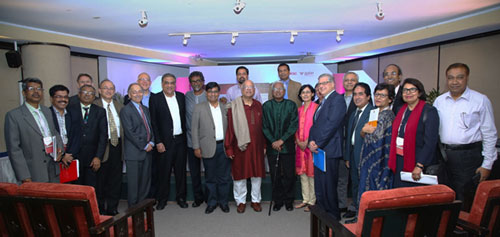
Global Alliance for Improved Nutrition (GAIN) and BRAC held a series of events to discuss Nutrition and the Sustainable Development Goals (SDGs): New Approaches to Partnership. The activities concluded today 2nd December with interactive knowledge sharing and a field visit at Palash Upazila (Sub-District), Narshingdi (District) in which the GAIN Global Board Members took part. GAIN’s discussion on SDGs started with a dialogue with government officials on 29 November where the Honourable Minister of Commerce Mr Tofail Ahmed M.P. was present as the Chief Guest.
The Honourable Minister of Commerce Mr. Tofail Ahmed M.P. attended the event as Chief Guest and Professor Dr. Gowher Rizvi, International Affairs Advisor to the honourable Prime Minister of the People’s Republic of Bangladesh was the special guest. Panel discussion was facilitated by Executive Director of GAIN, Marc Van Ameringen and discussants included, Mr. Md. Mosharraf Hossain Bhuiyan ndc, Secretary Ministry of Industries and Mr. Syed Monjurul Islam, Secretary Ministry of Health and Family Welfare, Laurent Umans, First Secretary, Food Security from the Netherland Embassy and Heather McBride, Deputy Director, Planning and Lead Analyst from the Canadian High Commission. The event was well attended by representatives from the Ministry of Finance, Ministry of Food, ERD the Social Development Fund, USAID, UNICEF and the European Union.
On 30 November the discussion focused on nutrition and the Sustainable Development Goals (SDGs) which was jointly organised by BRAC and GAIN. Dr. Kaosar Afsana, Director of BRAC Health, Nutrition and Population Programme (HNPP), Executive Director of GAIN, Marc Van Ameringen and Dr. Tahmeed Ahmed, Director, Nutrition and Clinical Services Division, icddr,b facilitated the event. Dr. Muhammed Musa, Executive Director of BRAC and Vinita Bali, Chair of the GAIN Board gave opening remarks. The Honourable Finance Minister Mr Abul Maal Abdul Muhith M.P. attended the event as Chief Guest and Mr Mosharraf Hossain Bhuiyan, Secretary of Ministry of Industry was the Special Guest. The founder and chairperson of BRAC, Sir Fazle Hasan Abed KCMG attended as a Special Guest and the event was attended by officials of different ministries of Government of Bangladesh, Board of Directors of GAIN Development, Civil Society and private sector partners and research organisations. Panel discussants included Dr. Khairul Hassan, Deputy Chief (Health), Ministry of Health & Family Welfare, Dr. Md. Quamrul Islam, Director, IPHN and Line Director, NNS, Mr. Shawn Baker Director of Nutrition, Bill and Malinda Gates Foundation (BMGF), Dr. Stanley Zlotkin Chief, Global Child Health, Hospital for Sick Children, Canada, Mr. Laurent Umans, First Secretary, Food Security, The Royal Netherlands Embassy, Ms. Christa Räder Country Representative WFP, Dr. Md. Ataur Rahman Health & Nutrition Adviser Canadian High Commission, Dr. Jiban Krishna Biswas, Director General, Bangladesh Rice Research Institute (BRRI), Ministry of Agriculture , Mr. Michael Anderson, Chief Executive Officer, Children’s Investment Fund Foundation, Mr. Omar Dary Senior Nutrition Adviser, USAID, Ms. Anuradha Narayan Chief, Nutrition Section, UNICEF and Ms. Abi Masefield NAS, Consultant, European Union.
Honourable Finance Minister Mr Muhith M.P. said, “Bangladesh has broken the shackles of extreme poverty through combined efforts of Government, NGOs, academia and private sector”. He also stressed on the importance of research based initiatives to tackle hindrances like poverty and malnutrition.
Sir Fazle emphasised in frugal innovations in bringing nutritious food at the door steps of people. He shared his experience on how BRAC addressed the condition of iodine deficiency in Bangladesh with a holistic approach including setting up salt mills to produce iodised salt. Sir Abed said, “To scale up nutrition intervention, a multi sectorial approach is necessary”. He also added that “the incidence of malnutrition is widespread not because of lack of food but because of lack of knowledge. Therefore, primary and secondary education curriculum may consider including relevant content on nutrition”. He also urged Ministry of Health and Family Welfare to step forward and persuade ministry of education to make this happen.
Mr Mosharraf Bhuyian, Secretary, Ministry of Industries, said, “The government of Bangladesh is committed to support the cause of combating micronutrient deficiency in Bangladesh. The Ministry of Industries has taken the lead in the Universal Salt Iodisation programme, with the goal of alleviating iodine deficiency by 2030. Mr Bhuyian highlighted the recent success of mandatory fortification of edible oil with Vitamin A as is a good example of a cost effective, scalable intervention.
Mr Jay Naidoo, the Chair of the Partnership Council of GAIN concluded the event with a vote of thanks.
Young coders develop app solutions on social problems
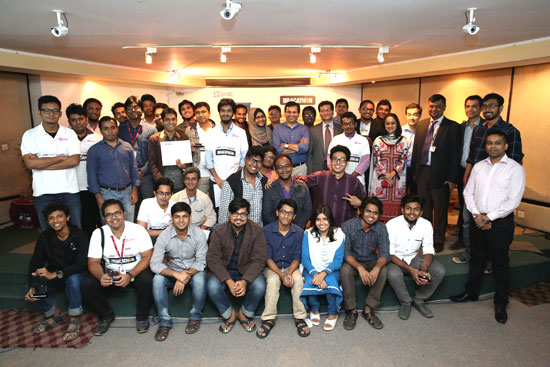
“BRACathon”- BRAC’s first ever hackathon attracted more than 120 budding app developers and students to compete for prize and developing useful mobile applications to contribute in social innovation. The 36 hour long BRACathon took place from 4-5 December 2015 in BRAC University. 27 teams including IT students and tech start-ups participated.
The theme of BRACathon was technology for social good. The participating teams were given 11 problems including TB prevention, micro-learning, microfinance data access, crowdsourcing information for city roads improvement, bKash user interface etc. Students from BRAC University, NSU, IUB, BUET, Ahsanullah University and technology start-ups including EMPOWER, Miyaki participated in this competition.
After the marathon 36 hours of coding, each team gave a presentation on their mobile app solution, in front of a jury board of 12 members. The jury board members included senior management from BRAC, representatives from DFID and Australian High Commission, faculties from BUET and BRAC University.
Based on the quality of the proposal, impact, innovation, functionality and presentation seven teams were announced as winners on 6th December 2015. Each of these seven teams will be given up to USD 3000 in order to help them to finalise their apps. BRAC IT specialists will provide further assistance and guidance to these young developers to scale up. In addition to this, BRAC will also help them implement these apps to enhance its operational efficiency.
The winners of the competition are Reboot, Miaki, AMITIE ,mPower Rangers, TRIUMPH IT, BUET Gamechangers and Technolive.
The award giving ceremony started with a panel discussion. Mr Anir Chowdhury, Policy advisor of prime minister’s office, Paul Whittingham, Deputy Country Representative, DFID Bangladesh were present among the other sector specialists. The discussion was moderated by BRAC and BRAC International’s senior director Asif Saleh.
Appreciating BRAC’s initiative at the prize giving ceremony, Mr Anir Chowdhury said, “Digital Bangladesh allows one person to do a lot of innovation. Digitalisation gives empowerment if used correctly. Digital Bangladesh provides the opportunity of young leadership.”
Deputy country representative of DFID Paul Whittingham, “We are committed to bring more young people in this field, so the voices are heard across. The best way to ensure that is through technology.”
Fifth year in a row

The Financial Reporting (FiRe) award was held in Kampala on 19 November 2015. At the event, BRAC Uganda was awarded the certificate of recognition for outstanding achievement in the general sub-category and named the winner in the non-governmental organisation category.
The award was received by BRAC Uganda’s country representative, country head of accounts and accounts manager. This is the fifth consecutive year when BRAC Uganda has won an award at an event organised by Institute of Certified Public Accountants of Uganda.
Join the world’s biggest family




